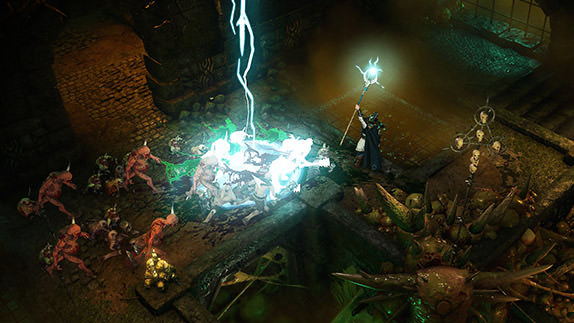The Spectrum Retreat Review

 By Kevin Mitchell | July 18, 2018
By Kevin Mitchell | July 18, 2018
Everyone loves additional attention when staying at a hotel, especially one as lavish as the art-deco inspired Penrose Hotel. The intriguing locale is hiding a secret, one that you'll uncover throughout the dark sci-fi narrative. From the moment you open your hotel room door for your daily morning personalized wake-up call from the manager, you realize that your stay at the Penrose is anything but ordinary. For starters, you begin to receive cryptic messages and calls on your futuristic phone from a woman called Cooper. There is also the revolving door at the hotel entrance, which doesn't actually have an exit to the outside (it just goes around and around). Did I mention that mannequin-like robots run the hotel?
BAFTA-winning designer Dan Smith developed The Spectrum Retreat as a 20-year-old a couple of years ago. Since that time, publisher Ripstone has worked alongside him to bring the game to market. In order to access additional floors, you must work with Cooper to piece together clues in the simulation to open access points used as authentication challenges by the QA team. That's right, the Penrose Hotel is a fully simulated paradise inside your mind. With the goal of reaching the roof and ultimately escaping (ending the simulation), the game's narrative evolves, altering the stability of the environment and your interaction with the staff as you piece together forgotten memories.
When you are not wandering the pristine halls of the hotel, you are using your phone to help you solve interactive environmental puzzles. At first, you are tasked with exchanging colors to safely pass through the corresponding barrier before reaching the exit. Each of the five floors in the game represents five sets of challenges for you to complete, each with a number of increasingly complex puzzles to solve. For example, the first floor only uses two colors, orange and white, but later on, you'll gain blue and green to complicate things, not to mention the game throws new mechanics at you. As you progress through the floors, the puzzles become much more complex in nature but never feel too overwhelming.
There aren't any checkpoints during the puzzles, which can become quite lengthy near the end of the game, requiring you to restart if you mess up. It didn't happen often, but having to redo a puzzle from the start after spending fifteen minutes trying to solve it because you missed changing a single color block is annoying. Thankfully, I enjoyed the late-game mechanics, adding matching color teleportation into the mix to reach previously unreachable areas, as well as rotating entire rooms around you. These offer a new perspective and highlight the verticality and precision needed when designing the puzzles. Not only that, but it kept the game feeling fresh, starting with puzzles limited to a couple of rooms in size and ending with an underground labyrinth to explore. You'll encounter moments from your past, memories hidden away, as you pass through a holographic representation of your living room or kitchen, complete with newspaper clippings and conversations/arguments with what is believed to be your wife. By the end, I knew where the dark narrative was heading, but it wasn't a deterrent for the impact that it left when you discover the truth.
The hotel exploration feels slow or sluggish as you are required to backtrack throughout to find the proper clues hidden on other floors and return to the keypads to unlock the next set of puzzles. The game does some interesting things to help remedy the slow pacing when you are exploring the hotel later in the game that fits within the simulation narrative. The overall sound design in the game is spot on, from the voice acting to the atmospheric music played when solving puzzles. If you get stuck on how to proceed while exploring the Penrose, you'll get a bit of a nudge from Cooper on where to go next or what to interact with. There are two different endings to the game depending upon a choice given to you at the end; however, once completed, you are only presented with the option of starting a new game. There isn't a chapter select or save states to continue from. At first, I was disappointed, especially since the endings are tied to separate achievements, but the more I thought about it, the more it made sense within the context of the game. You are stuck in a neverending simulated loop of waking up, crossing off the same day on your calendar before walking downstairs to your premade perfect breakfast.
Simply Put
The Spectrum Retreat is an emotional narrative combined with enjoyable puzzle solving using unique gameplay mechanics. The story is well-told, and I was amazed at how the simulated world begins to feel broken the closer you get to the truth, as if you are rejecting this reality. The mannequin-like staff works beautifully with the style of the hotel, except for the couple of times where they suddenly appear behind you. The backtracking does slow down the pacing of the game, and I do wish there was some rewind function for some of the longer puzzles, as having to restart them is a bit of a nuisance. Considering that the puzzles may have dozens of interactable blocks to mess around with, I do understand it may be asking too much without having to overhaul the puzzle system.
Note: The Spectrum Retreat was reviewed on Xbox One. A digital copy of the game was provided by the publisher/developer.




